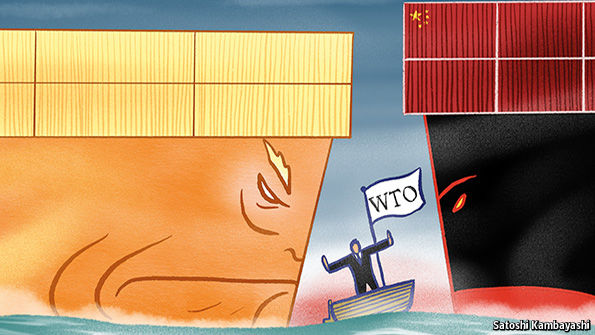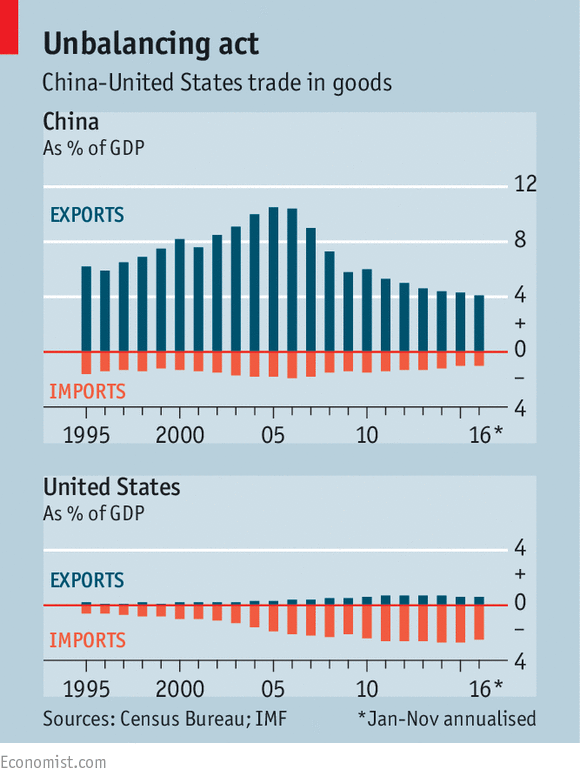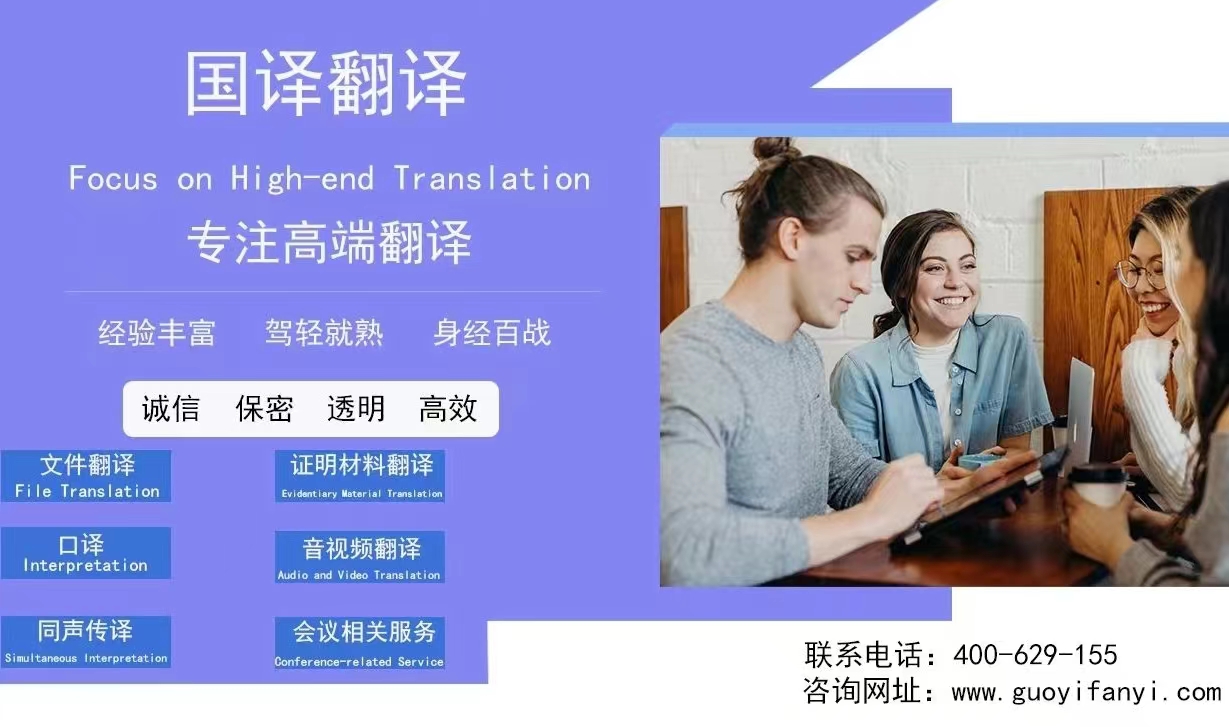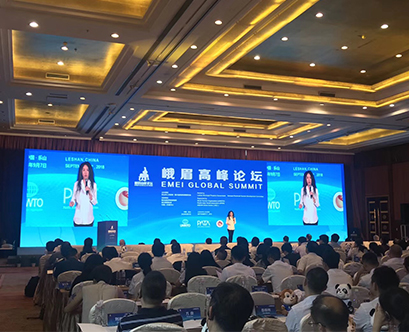特朗普上任,中美贸易战是否一触即发?
本文原载于The Economist
编译/伍豪 & eve
译读:T-Read | 译读小号二世:WinnieTheFool
特朗普保护美国工人阶级免受外国欺诈的行动已经开始。不过他的第一波治国推特以及总统令里却引人注目地没有提到中国——他最爱拿来吓唬人的假想敌。竞选期间,特朗普指责中国操纵货币、蔑视国际贸易规则,还威胁要对中国商品征收45%的关税,赢得了支持者的欢呼一片。现在,全世界都在等着看他说过的话有多少作数。
把中国列为货币操纵国的承诺没有被再度提起。对此,乐观的解释是特朗普意识到,这种承诺只符合“曾经的”事实——中国已经不再为了提高贸易竞争力而压低汇率,他们现在所做的恰恰相反。而悲观的解释则是特朗普钦定的财长史蒂芬·努钦本来要履行这项承诺,但他的提名还有待参议院投票通过。
特朗普当然有能力制造贸易混乱。全面大幅提高关税会打击整个产业链,损害美国消费者利益,公然挑衅WTO监管下的全球贸易规则体系。不过,相比于搞垮全球贸易体系,特朗普或许会决定在现有体制下同中国较量。尽管没有点名中国,但白宫官网已放出口风,要“使用联邦政府手头的任何工具”来终结贸易违规行为。
贸易失衡:中美进出口各占GDP比重
在任职认可听证会上,特朗普提名的商务部长威尔伯·罗斯令人略感宽慰地表示,上世纪30年代提高了数千种商品关税的斯姆特-霍利关税法(The Smoot-Hawley Tariff Act)已经让他吸取了教训。(“这项法案当时并没有成功,放到今天也很有可能不成功。”)罗斯在自己的政策纲要里也威胁要“惩罚”不遵守贸易规则的国家。他暗示他领导下的商务部将主动实施反倾销行动,不会将此难题留给企业。特朗普提名的美国贸易代表罗伯特·莱特希泽则是贸易领域的资深律师,熟稔WTO法律,他将热衷于在法庭上开展贸易斗争。
好用诉讼手段对付中国基本没有偏离美国的一贯做法。奥巴马执政期间,美国贸易代表共对中国发起过16次诉讼,主题既有中国对美国钢铁与汽车的非法征税,也有倾销及损害美国进口商利益的稀土出口限额。就在本周,奥巴马政府发起的、指控中国非法农业补贴的大型诉讼案已经正式开庭。
但激化矛盾仍然可能导致中国采取报复行动。2009年,当美国决定对大量涌入美国市场的中国产轮胎征收惩罚性关税,中国取消从美国进口鸡爪,转向了阿根廷与巴西。这一次中国可能选择的报复目标包括美国产的大豆与飞机,其贸易额共占美国对中国总出口的四分之一。对中国来说,完全放弃从美国进口大豆或许有些困难。不过印第安纳州的大豆种植者肯尼·凯恩担心,如果中国选择到别国采购,美国大豆的价格会跳水三分之一。相比之下,尽管中国还无法自行生产出高质量的民航飞机,但他们的订单可以转向欧洲企业空中客车。
另一种风险是WTO体系可能会在各种新的贸易诉讼案的压力下崩溃。目前WTO已经超负荷运转,各种裁决都在延期。由于有预算帽的限制,且雇员人数不能超过640,WTO已然疲于应对过去几年中不断增多的贸易争端。
用非常强硬的方法处理贸易问题可能会暴露出更根本性的问题:彼得森国际经济研究所的查得·布朗表示,“WTO的法律条文在文字上并不够清晰”。特朗普说的没错,中国确实没有一直遵守国际贸易法。但是他可能会发现,即使要一字不差地遵守法律条文,也是说起来容易做起来难。譬如说,WTO法律对国有企业并没有绝对严格的定义,因此要辨明来自国有银行的补贴并予以反对就很困难了。
奥巴马针对此问题的策略是打造一套多边贸易协议,其中既包括对国有企业的明确定义,也有关于货币操纵的章节,还要设立劳工与环境标准,而以上这一切都意在保护美国工人阶级,防范“不公平”竞争。这套名为TPP的协议从一开始就将中国排除在外。不过TPP的长远打算是中国有一天不得不加入协议,因此必须接受主要由美国制定的条款。而特朗普本周退出了TPP。
特朗普的战略显然不同。只要他是在WTO规则内与中国斗争,世界就应该能避免贸易战。哪怕WTO认定美国的贸易措施违反了贸易规则,规则本身也能限制报复行动的规模。要是在WTO体系之外,那就一切都不好说了。
America, China and the risk of a trade war
Trade tensions will mount, but a destructive trade war can still be averted
DONALD TRUMP’S quest to protect American workers from cheating foreigners has begun. But in his first flurry of policy tweets and executive orders, China, his favourite bogeyman, was conspicuously absent. On the campaign trail he deplored China’s currency manipulation, accused it of flouting global trade rules and threatened a 45% tariff on its exports, all to cheering crowds. Now, the world is waiting to see how much of this he meant.
The promise to label China a currency manipulator has not been repeated. An optimistic interpretation is that Mr Trump has realised that the promise was based on an “alternative” fact. China is no longer squashing its currency to gain a competitive edge, but is instead propping it up. A pessimistic one is that Steven Mnuchin, his treasury secretary, who would do the labelling, is not yet confirmed by the Senate.<iframe class="teads-resize" style="width: 631.34375px; border-style: none !important; height: 0px !important; min-height: 0px !important; margin: 0px !important; padding: 0px !important; display: block !important;"></iframe>
Mr Trump certainly has the power to wreak trade havoc. A big blanket tariff would slice through supply chains, hurt American consumers and fly in the face of the global system of trade rules overseen by the World Trade Organisation (WTO). But, rather than blow up the world’s trading system, Mr Trump may yet decide to take on China within it. The White House website, without naming China, promises “to use every tool at the federal government’s disposal” to end trade abuses.
Latest stories
In the process of being confirmed as Mr Trump’s commerce secretary, Wilbur Ross somewhat reassuringly said that he had learned the lessons of the Smoot-Hawley Tariff Act, which raised thousands of tariffs in the 1930s. (It “didn’t work very well, and it very likely wouldn’t work now”.) His own policy includes a threat to “punish” countries not playing by the rules. He suggested his department might start its own actions against foreign dumping, rather than leaving them to industry. Robert Lighthizer, Mr Trump’s proposed US trade representative (USTR) and a veteran trade lawyer, knows WTO law inside out, and will be keen to scrap in the courts.
A litigious approach to the Chinese would not mark a huge break from the past. Under Barack Obama the USTR challenged China 16 times, on issues from illegal taxes on American steel and cars to dumping and export quotas on rare earths that harmed American importers. Just this week a massive case accusing China of illegal agricultural subsidies, which was filed by the previous administration, kicked off.
Ramping up tensions still risks Chinese retaliation. When America imposed tariffs on surging imports of Chinese tyres in 2009, China started importing chicken’s feet from Argentina and Brazil instead of America. Possible targets for Chinese reprisals this time include American soyabeans and aircraft, which together make up a quarter of American exports to China. China would find it hard to replace its entire supply of American soyabeans. But Kenny Cain, a soyabean farmer from Indiana, worries that prices could plunge by a third if China were to shop elsewhere. Although China cannot yet make high-quality commercial airliners, it could divert purchases to Airbus, a European manufacturer.
A second risk is that the WTO architecture crumbles under the pressure of new cases. Resources are already stretched and decisions delayed. Constrained by a budget cap and a limit of 640 employees, it has struggled to cope with an increased number of disputes in the past few years.
A highly adversarial approach to trade could expose a more fundamental problem: “As written, the WTO rules are just not clear enough,” says Chad Bown of the Peterson Institute for International Economics. Mr Trump is right that China has not always adhered to the spirit of global trade law. But he may find that even holding it to the letter of the law is easier said than done. For example, WTO law offers no watertight definition of a state-owned enterprise, so it is hard to identify and oppose subsidies from state-owned banks.
Mr Obama’s strategy for solving the problem was to craft a multilateral trade agreement that included definitions of state-owned enterprises, a section on currency manipulation and chapters on labour and environmental standards, all meant to protect American workers against “unfair” competition. Called the Trans-Pacific Partnership, it initially excluded China. But the hope was that China would one day have to accede, thereby accepting rules written in large measure by America. Mr Trump scrapped it this week.
His strategy is clearly different. As long as he fights China on WTO rules, the world should avoid a trade war. Even if the WTO finds that American trade measures violate their rules, those rules set limits on the extent of retaliation allowed. Outside the WTO, all bets are off.
越南语口译价格:国译翻译公司更好地服务于全球不同顾客,建立了包括业务部、客服部、翻译部、国际部、财务部、网络部及DTP排版设计部在内的综合服务部门,国译翻译各部门责权明细,配合紧密,使我们在为客户提供多元化的笔译和口译服务时得心应手,显示出强大的效率优势。国译翻译公司国际化的高端品牌定位,历经10多年的磨砺,专业化的翻译团队,使国译翻译一举成为译界翘楚。
您只需要一通电话,一个传真,一封电子邮件就可以足不出户尽享快捷的高效翻译服务,国译翻译随时随地提供免费的全天候报价服务,24小时全国热线:400-629-155,欢迎您的致电















